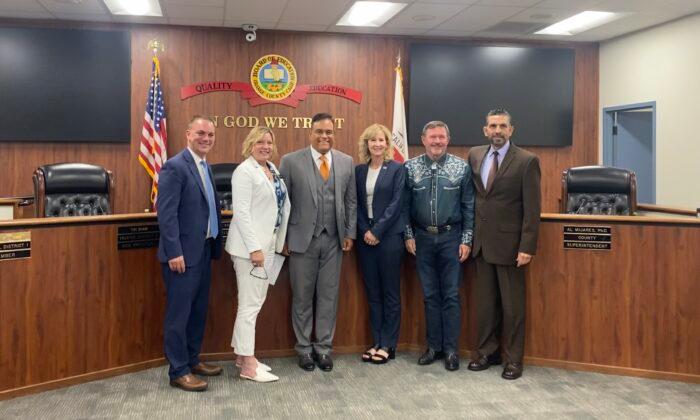In July, Chino Valley Unified became the first school district in the state to enact such a policy, which would require schools to notify parents when their child begins to identify as a different gender.
Since then, the district has come under fire from state officials, who claim the policy violates state privacy laws and would put LGBT students’ safety at risk.
According to Ms. Shaw, her goal in pushing for the policy was simply to keep parents involved in their children’s lives. She didn’t think her school districts’ state funding would be threatened.
“This is something really important to your child’s life,” she said. “I’m thinking this is a common sense, simple policy. I never imagined the state coming after us.”

In August, State Attorney General Rob Bonta announced the state was suing Chino Valley Unified over the policy.
In a Sept. 6 statement, the attorney general said the ruling will “protect kids from harm.”
However, Ms. Shaw told California Insider that state officials never directly addressed the district with their concerns.
“I would love to sit down and have this conversation with [Mr. Bonta] or [Gov. Gavin Newsom]. We always find out their argument from the media,” she said, adding that even when the district got served with the lawsuit, the media had reported it two days prior.
The policy requires schools to notify parents in writing within three days if their child requests to use names, pronouns, bathrooms, or locker rooms that don’t “align with the student’s biological sex or gender,” asks to participate in athletic programs that don’t align with the student’s biological sex, or requests to change information in his or her school records.
It also outlines steps to take if the child is involved in bullying or violence or communicates thoughts of suicide.

Additionally, the lawsuit cites state education codes and federal laws that ensure equal protection to all students and prohibit discrimination on the basis of gender identity and gender expression.
Ms. Shaw, however, argues that the education department’s guidelines are not legally binding, and that such laws were originally put in place to “keep the privacy of the students from third parties and the government—never the parents.”
“Now you have third parties and [the] government using those privacy laws and guidelines against the parents,” she said. “We develop these things as a nation and as a state to keep privacy from the government, and the government is now saying, ‘No, we want to take that away from the parents.’”
Ms. Shaw continued, saying that if a school staff member believed a child was unsafe at home, then they should already have reported such to Child Protective Services as mandated reporters.
“Teachers and administrators are mandated reporters. I’m a mandated reporter. If I know a kid’s in danger, we have to report that right away to the authorities ... [and] call Child Protective Services and initiate that process,” she said, adding that the state should focus on improving its Child Protective Services and foster care systems.

“If you’re going to start determining that these parents are dangerous and hateful, you'd better have a really good place to put [the children],” she said. ”These kids are committing suicide in the foster care system too.”
During the interview, Ms. Shaw tearfully recounted her own experiences as a child growing up in a rough home situation and temporarily being placed in foster care with her siblings.
“I know that the schools do provide things that sometimes parents can’t provide,” she said.
However, it’s beneficial for the children when a parent can be part of the process and develop a trusting relationship with the school staff, she said.
“If we’re trying to take the parents away, [from] the most vulnerable population, I think that’s the biggest mistake,” Ms. Shaw said. “School districts and the government, we have resources. Let’s offer resources instead of ... [shying] away from having any kind of relationship with the parent.”
Since July, at least six other California school districts have enacted similar policies: Murrieta Valley Unified, Temecula Valley Unified, the Anderson Union High School District, Rocklin Unified, Orange Unified and Dry Creek Elementary Joint School District.






